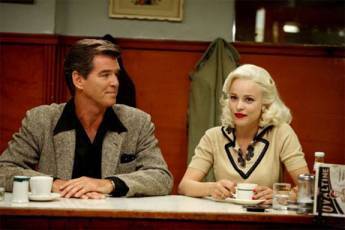 PIERCE BROSNAN, RACHEL MCADAMS[/B[b]Marriage woes of a solemn fool
PIERCE BROSNAN, RACHEL MCADAMS[/B[b]Marriage woes of a solemn fool Ira Sachs’
Forty Shades of Blue was a story about a young Russian émigré woman and her American music impresario husband who isn’t really there for her—it’s a movie that’s rambling, freshly observed, carefully planted in its southern milieu, and vérité in style. For his new feature Sachs was granted the opportunity to work in the Hollywood system with name actors, and he chose to shift gears completely. He adapted an old "genre" novel (his word) by John Bingham, who was John Le Carré’s mentor in MI5 and the model for Le Carré’s iconic character, George Smiley.
Married Life is a glossy period story with ironic twists. It’s set in the early Fifties. Partly a social comedy, partly a tongue-in-cheek thriller, partly a perverse love story, it weaves back and forth a bit too much among all these possibilities to leave a lasting impression. It’s a glossy, stylishly controlled inanity all ready for the collector’s shelf.
Harry Allen (Chris Cooper) wants to run off with a young blonde and thinks he must kill his wife to spare her the pain of divorce. That’s a new kind of mercy killing, a droll motive for murder. Whether it’s a good pretext for a meditation on relationships and love, as the director believes, is another question. A greater awareness of the period might have led to the observation that divorce itself, at that time a somewhat scandalous social institution, was more disturbing than the mere psychological loss of a loved one.
Sachs is a gay man approaching straight marriage through the filter of a penchant for Joan Crawford and Bette Davis movies, much as Todd Hughes approached a Fifties interracial affair and a married man’s homosexuality through the filter of Douglas Sirk melodramas in his
Far from Heaven—which, like this movie, featured Patricia Clarkson as the wife.
Married Life is more restrained than the style-obsessed
Far from Heaven. But though it annoys less, it does not impress as much. Both movies are feasts of campy gay cinematic style, but while Haynes launched a thousand hot debates,
Married Life makes one nod "Oh yes," and move on.
With its world of stifling bourgeois
poshlost and its bumbling, trapped killer, this film is reminiscent of some of the minor novels of Vladimir Nabokov. And that would be a good thing, if only Sachs were Nabokov; but he isn’t. Sachs’ protagonist, Harry Allen, is a solemn fool. He goes about planning his murder, unaware that introducing his friend Richard Langley (a pleasant, but somewhat stilted, Pierce Brosnan) to his new girlfriend Kay (Rachel McAdams), a young widow, is a very risky move, given that she’s an out-and-out babe and Richard is appealing, available, and drives a nice convertible. Anyone with an emotional IQ of 100 would see Richard has more charm than the dour Harry; but Harry’s level is well below average, even for the disdainful 21st century conception of the American Fifties. Harry’s also seriously mistaken about his wife Pat (Ms. Clarkson, in a dark red wig): she has other quite appetizing possibilities he isn’t in the least aware of.
The movie advances at a measured pace with all its period accoutrements tidily in place. Everyone has dyed hair and Chris Cooper’s apparent proclivity for very dark suits is immaculately in evidence. An atmosphere of great restraint is created, the better to stun us with the story’s bombshells. But it never really does.
While in
Far from Heaven the emotions were ramped up and operatic, those of Married Life cause barely a ripple. People say they love each other, but we don’t feel it and there’s no visible chemistry between the actors. There is some limited compensation in the dry comedy of certain lines of dialogue. There is stylized, if wan, amusement in the repetition of an idea, "a person like you can’t build happiness on the suffering of others, not with the burden of morality you carry," spoken unwittingly by several characters. But that’s not exactly an epigram. True, there’s something unique about the confection Sachs has so carefully whipped up. But while this is more coherent than Hayne’s Fifties melodrama, it utterly lacks its impact. According to Sachs,
Five Roundabouts to Heaven, Bingham’s source novel, ends with a lot of people dying. That might have been nice. Couples deciding to stay together after all? Gee, this is quite the time for Family Values.
Married Life ends with a solemnity so completely worthy of its humorless hero one may wonder if one’s earlier giggles had been intended.





